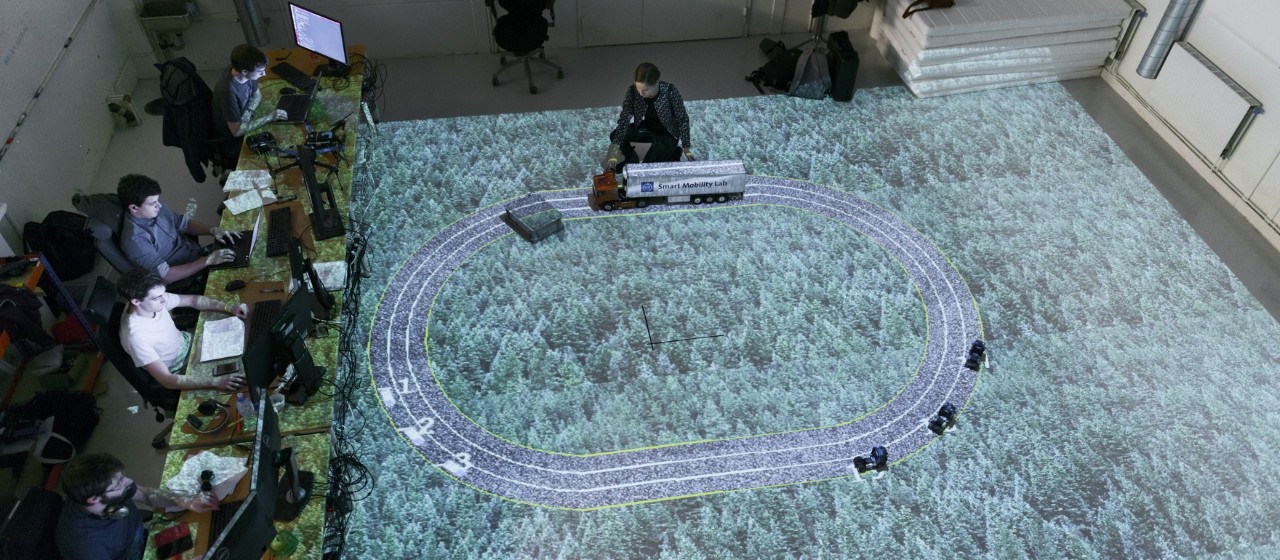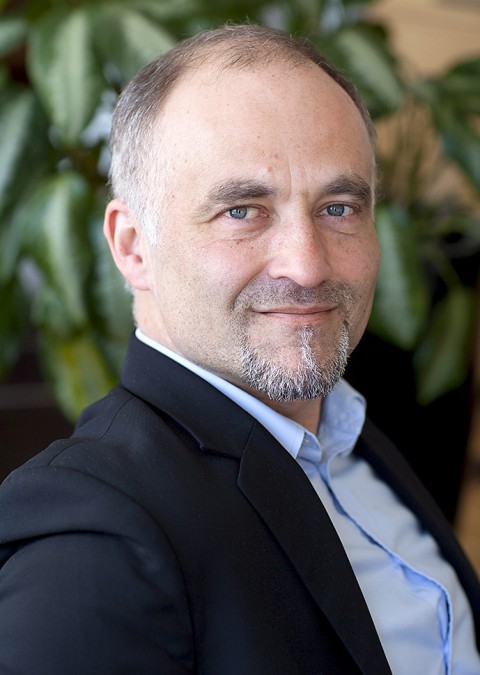
Shaping the future
19 MAY 2016
What form will tomorrow’s transport take? The researchers at the Integrated Transport Research Lab in Stockholm might have the answers.
The Integrated Transport Research Lab (ITRL) at Stockholm’s KTH Royal Institute of Technology is located in what to the outside world looks like a suburban garage. But behind the doors of this unassuming building lies a high-tech laboratory, bustling with activity. On the floor, truck models roll along projected lanes, and quiet conversations are being held everywhere about ongoing projects. It’s here that ideas for tomorrow’s transport solutions are developed and tested.
ITRL is a joint initiative between KTH and Scania. It brings together researchers from several areas to work closely with the business community and conduct the research that could solve transport-related environmental challenges globally. In 2014, Scania became the primary funder of ITRL, and the operation, which had up until then been relatively vehicle-focused, reoriented itself towards solving major community problems.
A holistic view of the transport system
Ulf Ceder is Senior Manager at Scania’s Research & Development Support office and oversees future transport solutions. “Harald Ludanek, Scania’s Head of Research and Development had a vision of shifting ITRL’s focus towards system solutions,” Ceder says. “Scania has a holistic view of the transport system in which different forms of transport, infrastructure, policy, and business models are all linked together. We can’t produce these kinds of solutions by ourselves, and instead need to do it in cooperation with customers, cities, and other partners.”
Rapid progress has since been made, and six months ago Swedish telecom giant Ericsson also opted to become a partner in ITRL. Scania and Ericsson are together investing EUR 7.5 million over a seven-year period. KTH and other financiers are contributing an equivalent sum.
Peter Georén is Head of ITRL. “In seven years, this will be Europe’s most important forum for transport research using a systemic approach,” he says. “We will have commenced research worth EUR 20 million and will have become a hub for KTH’s 400 or so transport researchers.”
KTH’s research currently focuses on four different research programs. These are: efficient goods transport in urban environments; automation and multimodal goods transport; automated public transport; and next generation private car transport.
Long-term strategies needed
Transport in urban environments is an issue that is becoming all the more important across the world. The number of vehicles on the roads is steadily growing. One study predicts the number will surpass two billion by 2030. This is a direct consequence of global urbanisation. According to a UN estimate, by 2050 over 66 percent of the world’s population will live in cities. As a result, new, long-term strategies are needed to endure the system doesn’t collapse. Scania sees its partnership with ITRL as central to finding new solutions.
Ulf Ceder explains: “Cities are primarily seeking solutions for their increasingly large congestion costs. So, Scania’s solution isn’t to sell more cars or trucks. We have to be able to help cities with solutions for their problems. For our part, this represents a different and more complex approach to business, involving other solutions.”
Ceder continues, “Among the problems we face today is large-scale waste in the transport system. Loads that significantly under capacity and poor use of infrastructure capacity. This isn’t a problem we can solve ourselves, but through cooperation with others our knowledge of flows and modular thinking will benefit both Scania and the community. It’s an important part of our sustainability work.”

“Scania will take the lead in sustainable transport”
When academia with its core of knowledge, the corporate world with its commercial drive, and the community with its list of demands all come together to produce solutions for shared problems, the results can be extremely long lasting. Scania and Ericsson’s respective expertise within the transport sector and the coming 5G network technology make it possible to create a unique testing ground.
“Scania will take the lead in sustainable transport, and we will achieve this by contributing to development,” says Ulf Ceder. “We can contribute knowledge and solutions that help create the required conditions for a better environment, more efficient transport, and new business opportunities for us as a company. It’s a win-win situation.”
SPECIFIC RESEARCH AND DEMO PROJECTS
CMA – Connected Mobility Arena Stockholm
Examining smart transport services through connectivity, Scania, KTH, Ericsson and Stockholm City are working together on this project related to automated goods-delivery and public-transport services. A test site is being created at Kista outside Stockholm, with Ericsson providing full 5G-network coverage.
Vehicles with three different levels of automation will be tested, including heavy trucks and buses for use in public transport. First-level vehicles have drivers and their operation is made more efficient through real-time contextual information. This might relate to current levels of accessibility or exactly when goods or passengers are ready to be picked up. The goal is efficiency across all levels, but also service at an individual level and reduced environmental impacts.
The project is also investigating semi-automated vehicles that function independently and are either overseen or remotely controlled by human operators. The last stage being investigated involves vehicles that are completely automated and monitored by software. There are currently legal restrictions on the use of automated vehicles on public roads, but in 2016 Scania will begin testing self-driving vehicles in closed environments, such as mines.
Off-peak Stockholm
Off-peak is an externally financed (FFI) cooperative project involving partners including KTH, Scania Stockholm City, Lidl, Martin & Servera, and Svebol Logistics (now Bring). The project is primarily aimed at studying the effects of night-time inner city traffic for transport efficiency, business models, and policy.
“Stockholm City has given us special dispensation to lift the ban of inner-city truck traffic between 22.00 and 06.00 to operate a quiet, night-time transport operation in Stockholm, allowing us to conduct research into all of the above named areas,” says Ulf Ceder, Senior Manager at Scania’s Research & Development Support office.
Early results from the projects show that efficiency and vehicle use increase dramatically, and that drivers are less stressed during their runs.